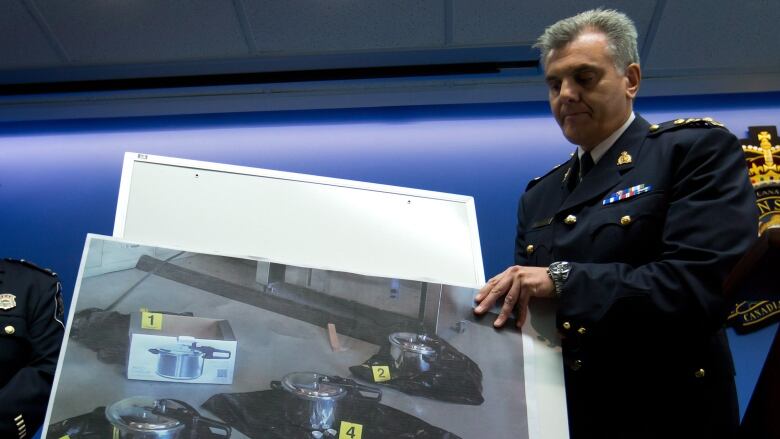Harper government seeks advice on how jihadis use internet
Conservatives condemned Justin Trudeau for wanting to understand 'root causes' of terrorism

The federal government wants advice about how terrorgroups use the internet to lure Canadians.
While it doesn't specificallyreference ISIS, the call for new research comes aday after Parliament voted to support sending CF-18 fighter jets to Iraq to fight the Sunni jihadi extremist group the Islamic State of Iraq and Syria, known for its use of online propaganda.
Public Safety Canada is asking researchers to submit proposalstostudy links between the internet and violent extremism, includinglookingat how to prevent or intervene when Canadians are being radicalized.
- More talk than action on the jihadist home front: Chris Hall
- ISIS threat to Canada not imminent but real, CSIS director warns
- Harper government missed deadline on jihadi tracking tool
"Betterunderstanding the role of the internet as a communications medium is crucial, given how it may play roles to both advocate and to counter narratives of violent extremism."
The background information supplied to potential bidders says the research the government wants "will increase
our understanding of terrorism, counter-terrorism and countering violent extremism, which will helpproduce more effective policies, tools and resources for law enforcement and people on the front lines.
"What makes this issueparticularly difficult to understand is that it is a complex and varied phenomenon," it continues.
"There is no simple or single set offactors" that lead to recruitment, the background says, and violent extremists "come from a variety of ethnic, cultural, educational,religious, regional and socio-economic backgrounds, as well as from different ages and genders.
"There can be a strong global dimension connecting to broader movements or outside organizations," it says.
Time to 'commit sociology?'
The call for submissions also raises the questionsof:
- What kinds of patterns exist in when and how groups form.
- How their support fluctuates.
- When and why individuals and groups turn violent.
The title given by the government on its request for proposal is "Assessment of the state of knowledge: Connections between research on the social psychology of the Internet and on violent extremism."
- Anti-radicalization program being developed by RCMP
- Group stunned RCMP pulled support from anti-terrorism handbook
- Mother of dead jihadi launches de-radicalization effort
- Canada's young men joining foreign jihad: Are we doing enough to stop it?
The government has mocked Liberal Leader Justin Trudeau for saying it is important to look at theroot causes of terrorism after the Boston Marathon bombings last year.
Harper said the proper response to suchviolence wasn't to "rationalize or make excuses" but "condemn it categorically, and to the extent you can deal with the perpetrators you deal with them as harshly as possible."
In April, Prime Minister Stephen Harper addressed a similar question after authorities arrested two men in Canada and accused them of trying to blow up a Via Rail train.
"I think, though, this is not a time to commit sociology, if I can use an expression," Harper said. "These things are serious threats, global terrorist attacks, people who have agendas of violence that are deep and abiding threats to all the values our society stands for."
Public Safety Canada later issued four additional tenders for research into terrorism, including one into the social psychology of terrorists and another into the role of women in terror groups.
Women have been shown to play a variety of roles, from basic logistics support, to gathering intelligence, to justifying and encouraging violence, to executing terrorist acts, says the document.
The researchers are also instructed to look into the motivations of female terrorists.
Research not about 'root causes': MacKay
The government says it's not fair to call these latest studies an examination of root causes.
"They are looking at ways in which we can obviously prevent and pre-empt terrorist acts. I think there is a difference, " said Justice Minister Peter MacKay.
"This study is obviously going to give us an insight into what people are thinking. Obviously we want to know if there are further actions we should be taking. that informs all public decision."
Conservative MP Darryl Kramp, who chairs the public safety committee, told reporters Wednesday that it's hard to know what lies at the root of homegrown extremism, but raised "violent video games" as a potential trigger.
"A lot of people feel it's from basically, let's just say, fundamentalist teachings. I'm just not even that sure if that is the genesis of all of this. Maybe part of it is people who have a weakness and all of a sudden, there's a violent video game and as they grow a little bit older, they outgrow that and maybe think they can take a little dose of reality to some of that fantasy that exists in that world," Kramp said.
Funding for the research comes from the Kanishka Project, a $10-million, five-year initiative the government announced in 2011, focusing on terrorism and how to counter it. The initiative is namedafter the Air India Flight 182 plane that was bombed on June 23, 1985, killing 329 people, most of themCanadians.
With files from Janyce McGregor and Laura Payton












_(720p).jpg)


 OFFICIAL HD MUSIC VIDEO.jpg)
.jpg)



























































































